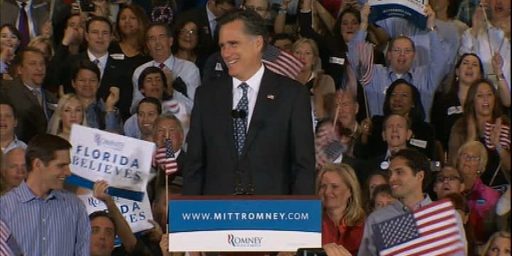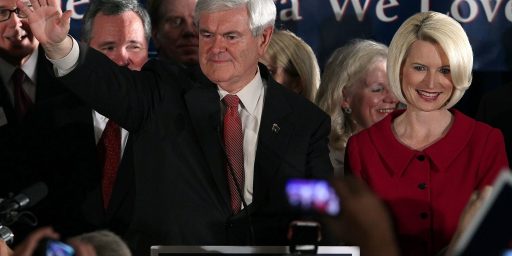More on Newt Gingrich’s Academic Career
Newt constantly lays claim to the title "historian" and asserts it as evidence of his insights and as a qualification for office. As such, the quality of the claim matters.
 I have written about Newt’s academic career (such as it was) before: Newt Gingrich, “Academic” and now the WSJ have unearthed some additional information: Gingrich’s College Records Show a Professor Hatching Big Plans.
I have written about Newt’s academic career (such as it was) before: Newt Gingrich, “Academic” and now the WSJ have unearthed some additional information: Gingrich’s College Records Show a Professor Hatching Big Plans.
I find Newt Gingrich’s academic career interesting for two fundamental reasons. One is personal: as a university professor I am understandably interested as it is a world with which I have a great deal of experience, and therefore provides insights into his early days with which I can easily identify and understand. The other is more broadly applicable: Newt constantly lays claim to the title “historian” and asserts it as evidence of his insights and as a qualification for office. As such, the quality of the claim matters. Indeed, the WSJ provides a good summation of the way these claims work:
Mr. Gingrich often says his experience as a historian would make him a superior president. During Monday’s GOP debate, he lectured “as a historian” on “a fact-based model” for revamping Social Security, citing the success of programs in Galveston, Texas, and Chile.
Let me note: the notion of an academic and “fact-based” approach to politics is one that I applaud in the abstract. However, in Gingrich’s case, the degree to which he can credibly make such claims is problematic. Indeed, when one looks back at his academic career the degree to which he can really claim to have been much of a historian/professor/academic are dubious. I note the thinness (to be kind) or his academic career in the post linked above and the WSJ piece doesn’t thicken the record, shall we say.
(Weird) Ambition. In his first year at West Georgia College he applied to be the college’s president and the next year he applied to be department chair. The first bit of information is new (to me, anyway) although I have read the second bit before. These are both profoundly odd moves for a young assistant professor to make for a host of reasons, especially the first one. Some basic background for those unfamiliar: assistant professors are hired on a tenure-track, meaning they typically have 5 to 6 years to make the case they ought to be granted tenure. The exact nature of that case depends on the institution, but includes teaching, service, and scholarship. A new Ph.D. in a such a position is acutely aware of the clock. It usually takes a year to get adjusted (not to mention preparing new classes) and one is not well settled in for two to three years. To not be granted tenure, by the way, means being told to leave. It is a slow-motion firing in which one is given a year after denial to find another job. As such, most assistant professors are quite focused on developing their tenure packet from day one.
To apply for the president’s position as a first year professor is weird for a lot of reasons, including the fact that to do so is to say that one wants to change careers (or, at least, substantially alter one’s career path). Now, I understand that people make career path shifts, however for a first year assistant professor to apply, immediately, for an administrative position for said first year prof to be saying, amongst other things “yes, I just spent half a decade plus acquiring graduate education in a specialized field, but I think that a year on the job using those skills should be enough for me.” For while it is true that both college professors and college presidents work in higher education, they are very different jobs. This is like a new accountant joining a large firm and applying to be the managing partner of the firm in his first year. Such an application would be viewed a s joke (which, I have no doubt, was how Gingrich’s application was viewed at the time).
Likewise, to seek to be the department chair as a second-year faculty member is likewise odd (although not as odd as pursuing the top administrative position at the school). First, you are likely to alienate your colleagues (after all, you just arrived). Second, and perhaps more importantly: without tenure you are going to be a lousy chair, since you don’t have the protection of tenure when you come into conflict with administration. Third, since you are still in the process of developing your classes, not to mention needing to focus on scholarship for tenure, you don’t need the time suck that is administrative work.
In general, both these moves indicate some (not mutually exclusive) possibilities:
1. Gingrich is highly egotistical (even moreso than most Ph.D.s). To assume that one ought to be the president of the college in your first year at a school and that you should be chair in your second takes some serious narcissism.
2. Gingrich is not very self-aware. Both of these moves are not only egotistical in the extreme, but they are also the moves of a man who isn’t aware of how he is coming across to others.
3. Gingrich never was serious about being a real historian. None of these moves indicate any real interest in scholarship. To become the president would have been to abandon any time for scholarship (indeed, it would have been an abandonment of teaching as well). To become chair would have severely diminished his time for research and writing. None of this indicate any planning on his part to create a viable academic career.
An Odd Path for a “Historian.” Apart from job-seeking, Gingrich’s teaching duties strike me as odd, especially if one is going to lay claim to the title “historian.” For example:
Mr. Gingrich coordinated the school’s fledgling environmental-studies department and by 1976 was removed from the history department because his “interest in long-range and broad-range planning for the future…is clearly more appropriate to the orientation of our Department of Geography,” a 1975 letter from then-college president Ward Pafford reads.
Now, that he moved from the History Department to the Department of Geography has been noted before. But let me note how strange this is. First, he was trained in history and yet he is described as having an interest in planning and the future. Now, the notion of using an understanding the past as a means of planning for the future is fine, but it is helpful to actually cultivate an actual background in one’s area of expertise before making recommendations about the future. Further, one would expect those recommendations to have something to do with one’s area of study. Gingrich’s dissertation was on the Belgian Congo. So, if he was going to be engaging in discussion of the future based on his academic expertise, one would expect it would be linked to his academic expertise (such a political development in the post-colonial world). However, there is no evidence that this is what happened. Instead, he is moved to the Geography Department, was teaching about the environment, and also apparently had a foray into planning for public schools:
After his unsuccessful bid for the president’s job, college officials asked him and a colleague to draw up ideas for modernizing the institution. That led to the 1973 creation of “The Institute for Directed Change and Renewal,” a platform the two men used to try to sell the institute’s services to public schools.
Mr. Gingrich wrote to a college vice president asking if it was “appropriate and legal” to profit from their work. College President Pafford responded swiftly: “You are not entitled to financial compensation by any other State of Georgia agency or institution,” he wrote in a memo. The institute soon went defunct.
None of this could be said to be linked to his graduate studies or his dissertation. Further, since he was such a new scholar he had not had time to develop new expertise. Instead, he just seemed to take the following view: I’m a smart guy and I have good ideas, so people should listen to me and give me important positions (which, quite frankly, is pretty much his campaign rationale). Also, like the applications for president and chair, this path does not indicate a serious interest in building an academic career (which is fine, by the way, but he needs to stop pretending like he had a real academic career).
A note on moving departments: often (although not always) one gets moved from one department to another (something that is rare, btw) because one is a trouble-making in the original department. Also (fair or not) a move from history to geography would normally be considered a demotion in terms of academic discipline (apologies to any geographers in the audience).
One last point on this count of his non-historian behavior:
Mr. Gingrich threw himself into working as “a specialist in futurism,” according to a 1973 college news release.
The interest is “futurism” is not news, but it is worth noting because being a futurist is pretty much the opposite of being a historian.
At any rate, the piece (and all examinations of Gingrich’s academic career) bring forth a portrait of an unhealthily self-confident, intellectually undisciplined individual whose claims to being a historian are shallow at best.






But apparently when it works, it works.
1. Gingrich is highly egotistical (even moreso than most Ph.D.s).
Duhhh…
2. Gingrich is not very self-aware.
Double Duhhhh….
3. Gingrich never was serious about being a real historian.
It’s a Hat-Trick! Triple duhhhhh… 😉
On the slightly more serious side, I have always been impressed by how impressed Newt is with himself.
Boy that’s the understatement of the month.
@Ron Beasley:
No kidding! It kills me that Newt calls himself a historian because he seems to know nothing about history, especially American history. Truth in advertising would require him to call himself a failed academician who couldn’t even get tenure at a third-rate college at a time when pretty much all it required was a penis, a couple of minor publications, and showing up to teach classes.
@john personna:
And it very often does work.
“Transcripts from an academic career that ended at least 20 years in the past, however, tell us absolutely nothing about what kind of person the candidate is today and may not even be that good an indication of how intelligent they are.” -Doug Mataconis
@Septimius:
“This post is not about academic transcripts”–Steven Taylor.
@Steven L. Taylor: I realize that. I just think it’s interesting that you believe Gingrich’s activities and behavior as a young college professor in the 1970’s can provide insight into the type of person/candidate he is today, and Doug thinks that Obama’s academic transcripts from the 1980’s can tell us nothing about what kind of person/candidate Obama is today. That is all.
@Septimius:
Is your position that one’s official actions as a professional are as indicative of one’s personality, motivations, and character as one’s grades in school?
If that’s your position, it’s not a very strong one.
@Septimius: Well,
1. As I often note: I am responsible for what I write, not what anyone else writes on the site ( and vice versa).
2. Newt’s academic career is quite relevant because HE constantly brings it up ( his claims basedon being an “historian” directly link to issues raised in this post).. If Obama was constantly making claims about the now based on his years in school, you would have far more of a point.
As a young college professor, Gingrich did not appear to take academics or his professional obligations as a faculty member very seriously – he was more interested in personal advancement. Its an early indicator of a pattern he has followed pretty much his entire life.
Can’t imagine why wanting to understand the character and seriousness of someone who says he should be the most powerful man in the world is not relevant. We heard endless tales of Ronald Reagan’s life as a young man & how he pulled himself up by his own bootstraps, and why not? It was a compelling story. Newt’s life story does not somehow become irrelevant because it is not very flattering.
@Rick Almeida: Did I say that? No. I don’t believe that one is necessarily “as indicative” as the other. I just think it’s interesting that one author on this site analyzes Newt Gingrich’s behavior as a young college professor and determines that he is highly egotistical, narcissistic, and lacks self-awareness; while another author on this site doesn’t believe that President Obama’s academic record has any bearing on the type of person/candidate he is today.
Personally, I think people can mature as they age and that neither Gingrich’s actions from 35+ years ago nor Obama’s academic record from 25+ years ago necessarily have anything to do with the kind of men they are today.
@Steven L. Taylor: I never implied that you were responsible for what Doug wrote. I tried to be clear in my distinction.
As to your second point, President Obama did campaign in 2008 as a former Constitutional Law Professor. It became a point of controversy in the primary. This site even wrote about it. Certainly his academic record could provide a teeny, tiny speck of insight into his credentials, no?
https://www.outsidethebeltway.com/obama_not_law_professor_just_taught_at_law_school/
@Septimius: Yes, but then the analogy would be an examination of his time teaching law school, yes?
Again: NEWT brings this issue up constantly. This makes it rather relevant. Trying to make this about Obama’s transcript is just being cutesy (not to mention irrelevant). Indeed, it is typical of commentary that is quite common and yet unhelpful. Instead of actually commenting on what is being discussed in the post, you are basically changing the subject while trying to score partisan points.
BTW: are you going to tell me that the traits described in this post aren’t the same traits her currently displays?
@Steven L. Taylor: First of all, I wasn’t trying to make it about Obama’s transcript. Doug Mataconis wrote an article today in which he took the position that Obama’s academic record can tell us nothing about his current character. (A point with which I agree, btw.) You wrote that Newt Gingrich’s actions as a college professor inform us about his egotism, narcissism, etc. I thought that was interesting.
I really have no interest in arguing about whether Newt Gingrich is a “historian” or not. The guy has a PhD in History and taught History at the College level for a number of years. To quibble about the “thinness” of his resume is, in my opinion, petty. He has done other things with his life.
As for me trying to score partisan political points, come on. Take a look at your site. Nearly every article written is critical and they are all critical of Republicans. I have yet to see any author on this site write anything that focused criticism on a Democrat (at least in the U.S. Politics section). Now, that’s certainly your right to do that, but please don’t act sanctimonious about it and accuse me of being “unhelpful” and only trying to score “partisan political points.”
And yes, I think Newt Gingrich is egotistical. He’s running for President of the United States for God’s sake!
@Septimius:
Actually, it you who tried to make an issue of it in this thread.
But, but, but, but….. Obama!
Considering the GOP field, it’s hardly a surprise that Republicans don’t really want to have a discussion about their own candidates.
@anjin-san:
Yep, that is about how it feels.
(And crud, I left out a “was”!)
@anjin-san: But, but, but, but…. Republicans are crazy, and stupid, and weird, and dangerous, and dumb, and bizarre. We’re so tolerant and open-minded. Anyone who disagrees with us is just unhelpful and trying to score partisan political points.
@Septimius:
Without joining in whomever you think “us” is, my critique of your comment is that a) it wasn’t about this post, save in the most tangential of ways), and b) you didn’t initially disagree with anything, you just tried to divert the conversation. Even later your “disagreement” with the post is that it was “petty”–really, I am not even sure what your point/goal is.
@Steven L. Taylor:
Not only that, @septimus’ argument about Obma doesn’t work particularly well because:
a. Transcripts as a student are fundamentally different than actions as a lecturer/teacher/professor. Obama’s claim was based on the fact he was teaching — excuse me lecturing — at U of C, not his particular grades at Harvard or Occidental.
b. Citing Jame’s post on Obama’s “professor claim” makes little sense, as James himself (again not you Steven) mentions the entire thing is a tempest in a teapot, writing:
All this goes to show @Septimus is the most boring of all trolls: that special mix of “look at how smart I am” and “I never said what I said.” I look forward to how long the denials will continue.
@ Septimius
You have yet to make even a single coherent post on this site. Please don’t whine because no one takes you seriously.
@Steven L. Taylor: Ok. I’ll explain it one more time. I found it interesting that, on the same day, you and Doug took very different positions regarding what past information was acceptable to use in determining the present character/ability of a presidential candidate. I never tried to prescribe Doug’s position to you. Nor, did I ever claim that they were totally analogous. But, I believe there is a disconnect if you argue that Gingrich’s past is relevant and Obama’s is not. That was my point. I’m certainly not saying that’s what you did, but your responses to me seem to indicate that you don’t believe President Obama’s academic transcripts can shed any light on his character/abilities.
I honestly wasn’t trying to turn this into a discussion of Obama’s college transcripts. I enjoy this site and revel in the back and forth with people who don’t agree with me. But, from an overall perspective (not specific to you, or your articles) it’s a little hard to argue policy if only one side is allowed to be presented/attacked.
Looking at the GOP presidential field, your statement is very accurate…
Septimus, my reading of your post and the back and forth is that you are mis-reading Steven’s original post, and all of his replies. You sound aggrieved, but, at least to me, you come across as simply not listening. You misread what Steven said, replied based on that misunderstanding, then continued to miss the central point in his follow-ups. Bottom line: if he said what you think he said you would have a legitimate point. But he didn’t say what you think he said. And explaining that to you doesn’t seem to have an effect.
Totally off-topic: I just read that old thread and have to back you up, Steven. I am an adjunct faculty member at St. Edward’s in Austin, and attended both ACC and UTSA over the past decade: in Central Texas, at least, “Professor” is the default salutation for any faculty member without a Ph.D. or other terminal degree.
@Gromitt Gunn:
My first academic position was a full-time, non tenture-track gig. I was ABD at the time. When I was hired, the dean walked me out to my car, shook my hand, and said, “Professor Almeida, welcome to the faculty.”
The way I’ve always understood it is that anyone who teaches at the college/university level is called “professor” as a matter of courtesy, distinct from the academic rank.
Newt seems constantly amazed by his own supposed brilliance and keeps assuming the rest of us have the same opinion.
Actually, the more intelligent and more intellectual the person is, the more likely he is to be wary of over-confidence and braggaccio. In academia, people who fall in love with their own theories are looked upon with disdain–you’re always supposed to be the harshest critic of your own ideas. Comparing Newt to actual historians like A.J.P. Taylor or Toynbee just show how much of a pompous, self-deluding idiot Newt is.
And no historian that I know would even go near anything called “futurism.” The first thing an actual study of history shows you is how impossible the future is to predict. Leave it for wild-eyed tech geeks.
But beyond the entire question of is professor/is not professor, is the question of what records are the best to judge a professor by. The correct answer would be the materials she produced while a professor: her publications, her syllabi (or syllabuses, if you are of that camp), feedback she gave on assignments, and student feedback. That individuals grades during grad (or undergrad) should not be a consideration.
There is a question in all of this that intrigues me. How long does it take a creative mind to understand what history is all about from a methodological and a love of the discipline viewpoint, and perhaps from a specific slice of history point of view? To follow that line, how long might it take for someone to weary of being immersed in the purely academic world as opposed to the present and potentially dynamic future of himself and our society outside of the academic world? A few years, perhaps, for a smart and ego-driven person?
I can agree that for Gingrich to tout his credentials as an historian too heavily is not appropriate, as they are weak from an academic point of view.
Perhaps he has felt more at home in or near government for these many years where there are enough problems surfacing daily to satisfy his cerebral popcorn mind. I have worked around many of these types of people, have been managed by some, and tried to manage quite a few. They were often disruptive of the team by their very nature and ego, but the key problem was always to sift out the really worthwhile ideas they come up with from the rest of the noise, and to exploit them properly. They seemed to me to be able to look at problems from a new and different perspective, and to be able to work out the first order of both their inherent worth and their difficulties somewhat fearlessly. It was always left to others, however, to dig deeper to find the second order difficulties in their ideas, and often the second order goodnesses too. That is what the team around such a person is challenged to do, and it is irritating to some in the extreme, but the results are the measure of success, such as the Contract With America.
@mannning:
The basic answer (especially to the bolded portion) is (and this is my honesty answer): a lifetime (or, at least, a good portion thereof). Now, this isn’t for everyone, even for people who have earned their doctorates.
Now, the answer here could be: almost immediately.
Of course if, as seems to be the case with Newt, one falls into the second category, then don’t go around calling oneself a “historian” and touting it as a reason to vote for one.
Beyond that: I do think that Newt’s biography (e.g., the academic career, the marriages) point to a person who is egotistical and self-centered beyond even your normally egotistical candidates for presidential candidates.
It’s not a big stretch to say Newt is pushing the red line on megalomania…
@Steven L. Taylor:
My own opinion is that the three aspects cited take differing times: methodology can be learned rather rapidly, say inside of several years; from a love of the discipline point of view, another number of years, perhaps as much as six; and from a specific slice of history view, it is a career that has no definite end. It most certainly takes much time if several languages are important to learn, for example, rather than relying solely upon translations.
I suggest that Mr.Gingrich easily comprehended the methodologies involved in a short time, became disappointed in the discipline, seeing a long road ahead to tenure and a reasonably good income, and therefore decided fairly soon not to spend the rest of his life wallowing in a special chunk of history, especially if the chunk he was attracted to was filled with highly competitive academics already.
One might say that he was a participant in the creation of a period of history within the US Congress from 1979 to 1998, which would fit his direct experience with more recent historical trends there in considerable detail. That doesn’t qualify him as an historian of the academic kind, however.
@mannning:
Fair enough, I suppose. Mostly you are describing one’s time in grad school (~6 years learning methodology and the basics) and then one’s career (which Gingrich appears to have pretty much have quit on from the get-go).
And yes: Gingrich has, by definition, been a participant in history (and was a significant figure in the 1990s).
@Ron Beasley: I love what Paul Krugman said, “Newt [Gingrich is] a stupid man’s idea of what a smart person sounds like.” (There was another Academician-Blogger that took credit for that, and it was different enough to be worth finding while close enough to be credible for where Krugman got it — lost track myself and Google was not helpful just now.)
Personally I would like to rewrite a George Bernard Shaw quote in Gingrich’s honor: “[Newt]’s brain digests philosophy into folly, science into superstition, and [history] into pedantry.”